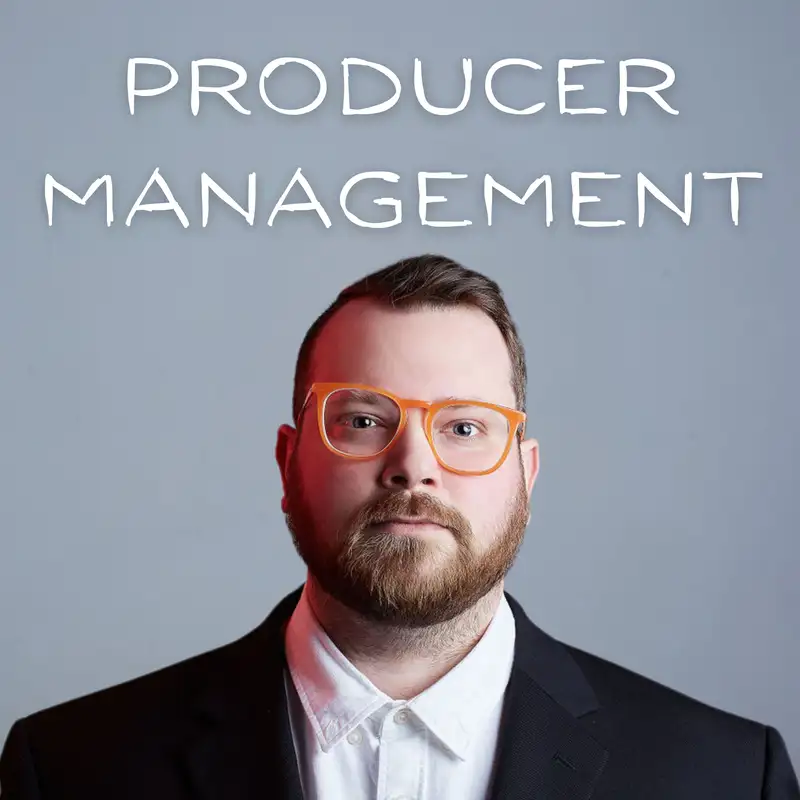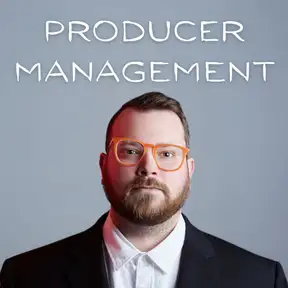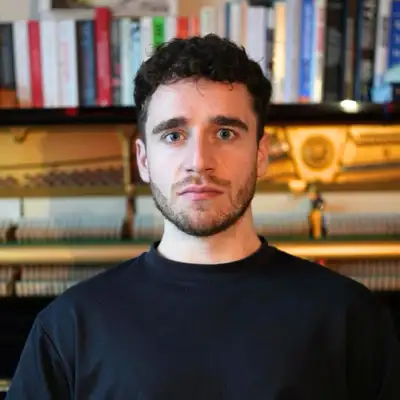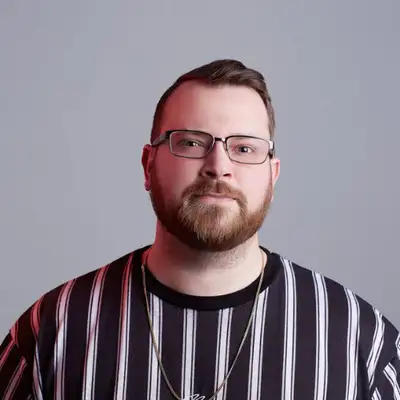
My Manuscript For Building A Producer’s Career (Special Episode)
Now, our unique angle is that we're the only company that helps producers manage both sides of their career, the industry side and the entrepreneurship side. In our opinion, this is what the next generation of working producers will look like, and evidence proves that to be more true every day. Hey, everyone, Daniel Grimmett here.
You're listening to Producer Management, the podcast that lets you in on real conversations between professional music producers and their teams, the deals, the strategies, and the unfiltered advice. This show is brought to you by my company, Dark Label Music. When producers want clarity, strategy, and growth, they call us.
We're not a course or a coach. We're hired as a strategic partner, part management, part creative and business development, designed for the realities of being a music producer right now. So whether you're a small studio or a Grammy-winning veteran, reach out to us at darklabelmusic.com to see if we can help.
See, yesterday, I spent a few hours writing what is probably the most important piece of content I've created in a while. It's a complete eight-part manuscript for building a record producer's career in the modern era, and I can almost guarantee that you've never read anything like it before. This morning, I sent it out to thousands of readers on my mailing list, and since it's a bit of a long read, I decided to also just read it here for you on the podcast in case you're more of an auditory listener.
Let's start here. Most working music producers sit around looking at each other on Instagram like they're at a dog show. Secretly, they whisper questions in their head like, how did they get that placement? Or why are they so popular? Or why do they seem to have all the clients? I just don't get it.
And this sends you into a loop trying to reverse engineer other producers' success. You may have even gotten the opportunity to ask one of these producers how they did it, but you still never really get a straight answer. It's like they don't even know how they got successful.
Or you just get the same advice that you've already heard, which validates what you've always thought deep down. This career must solely rely on chance and luck. At first, that sounds disheartening because luck seems completely out of our control.
However, after working with hundreds of music producers, I've found that not to be true at all. You've probably heard the old saying, luck is what happens when preparation meets opportunity. Producers tend to overvalue luck and undervalue the journey and strategy behind getting into a position where luck becomes more frequent.
We call these magic moments. At my company, Dark Label, we can actually spot patterns that somewhat shape a proven path for working music producers, and it removes a lot of the mystery surrounding this career. Over the past decade, we've been replicating this path with hundreds of producers.
Is it the only path? Of course not, but it works really well given that A, the producer is a self-starter, and B, they actually see the plan all the way through. That part is important because when it doesn't work, we know exactly why it doesn't work. At this point, my data pool is large enough to say that with a lot of certainty.
I didn't just test this with 100 producers, not even 500 producers. We're approaching 1,000 producers now. I think the number is somewhere between 700 and 800.
A quick side note, when I say working with these producers, I don't mean selling them a course. I mean actually working with them hands-on inside their careers. So these are the exact steps that we take to develop a producer from ground up to making a full-time living to landing their first publishing or management deal.
Steps one through four are what we would call producer development. So step one, the vibe check. There are some people who just aren't cut out for this career yet.
I'm not saying they never will be, but right now, they aren't. The first thing I look at is personality and communication style to see if they're going to be a good hang. Because if I would be embarrassed to refer artists to them, then I'm not going to take them on as a client.
If they're pessimistic, overly awkward, immature, super insecure, or kind of arrogant, I stop there. No offense, it's nothing personal. It's just not a fit for what we're doing.
At the same time, my partner Aaron is looking at their level of musicality. It's fine if they're an intermediate producer at this point, but we can't take on somebody who is a complete beginner, just doesn't really understand music. We've also noticed that there's a big difference between producers who have an understanding of music because maybe they grew up playing an instrument or something like that versus producers who have only ever clicked blocks in a DAW like they're playing a video game.
I'm not trying to be a snob or say that's a bad thing. It's not. I'm just saying that we do notice a big difference between those two camps in regards to how well they perform with this particular path.
Again, it's not the only path, just the one we prefer. Moving on, let's say that they pass the initial vibe check. Step two is honing their ears.
Most producers nowadays learn how to produce from courses, not from experience, and we can immediately tell. Initially, Aaron will have them spend a month or two just focused on one exercise, and this is what it looks like. Based on the producer's direction, they pick a couple of top-performing songs in that genre.
A quick side note here, most of our producers are pop producers or something adjacent like indie R&B, country, alternative, stuff like that. We're less likely to work with beat makers, EDM artists, or producers that only record bands unless they have the ability and desire to pivot into the type of producer that we work with and like to take through this path. Anyway, back to the exercise.
Aaron has them use AI software to break down these songs to the stem level, drum, synth, bass, etc., and then recreate those songs sound for sound from scratch and do it over and over again. It's a bit of a grueling process, but it is the absolute best way for producers to develop their ears. This process allows Aaron to quickly spot and fix the producer's skill gaps by comparing their version of finished to the original producer's version of finished.
My first mentor worked at a company making karaoke tracks back in the 90s. Every day for years, he just recreated recordings of classic songs. When I first met him and I remember asking him, hey, how did you get so good? That is what he told me.
That's what he attributed his skills to, and I've heard that same thing from many top producers that I've spoken with. They all took time to learn that way, so this is something we've decided to replicate. Step three is about developing taste.
Once Aaron knows our producer can trust their own ears, they focus on developing original tracks that really lean into the producer's unique background process and vision. We're not trying to create copycats, nor are we trying to create wild experimental stuff. Our goal is to create producers who will shape the sound of commercial music over the next five to 15 years.
At this point, we don't move forward until the producer has about three solid tracks that truly demonstrate their depth as a music maker. Then we move on to step four. Step four is what we call experience and evidence.
It's one of the coolest parts of how we develop producers. My partner Aaron came up in major label rooms pretty much from day one, starting when he was a teenager. That's the only world he knows.
He attributes his skills and success to constantly being around top-tier producers and writers who set a really high bar for him right from the start. This was the ultimate shortcut, but Aaron was lucky to have that opportunity early on. Not everyone has that opportunity or comes up that way.
We decided it was imperative to replicate this environment. Our producer will take their three tracks and then we pair them with major label writers for sessions. This isn't like a writing camp retreat kind of thing with a bunch of people.
It's just the producer, Aaron, and the writer. That's it. Super intimate.
This is how our producer will build their initial portfolio. We also take this time to make sure our producer knows how to organize and lead sessions working with legit people, whether it's in person or remote. The point of this experience is to quickly build confidence and remove as much imposter syndrome as we can right out of the gate.
Think about it. If they've already worked with major label talent, it becomes much easier for them to connect and build a business with independent artists later on. They've technically already worked with more established people and now they have evidence to prove that.
By this point, they built a small but mighty portfolio of killer songs with the writers we put them with, and they can demonstrate that they are above average. That is really important at the start. Our producer now understands how high the bar really is in the real world.
Something that things like YouTube tutorials can't really show them. This step isn't just about teaching production. It's about transforming them into someone that serious people take seriously and want to work with.
Now we move on to business development. Steps five through seven, step five, business bootcamp. Next up, we run a producer through a quick business bootcamp.
It's not 30 plus hours of videos. That would be a waste of time because businesses are built through experience, not watching videos. However, we do need to train them up first that they understand how this business works and they have the confidence to actually start and do what we're going to tell them to do.
Quick side note, if we're working with a producer that is already established or has a business, then we usually skip the producer development steps one through four and then we start here on step five and just kind of use this as more of an audit to fill any gaps and get things up and running. With most of our producers, we start with freelance work as the business model, basically just getting hired by artists to produce songs for them. Why? Because it's a great model to just learn the fundamentals of how to run a business.
It's controllable, one of the most controllable things in the music industry, and it's essentially paid practice. If they're going to build a song catalog and produce records anyway, they might as well get paid to do it. They get to hone their craft and start building reputation for actually doing the thing, not just making content about it.
Step six is business execution. So next, we spend a few months helping the producer build out their opportunity pipeline. This is a system that turns artists they meet into paying clients, and the first version of this pipeline is pretty simple.
There's a couple of versions, but the first version is this. Find an artist, reach out, get them into a session, transition it to a paid project. Obviously, there are a handful of skills to develop in order to pull that off, but more on that in a minute.
This pipeline keeps the bills paid while they continue to grow their catalog and reputation. We write them a plan with specific actions to do, and then we use a proprietary tracking tool that instantly reveals what areas they need to improve on. This is how we make sure they're actually developing the skills they need for the pipeline to function long-term.
Quick side note, this part of the process has to be skill-based, not based on luck, or it will fall apart later. So we are cautious when it comes to quick wins at this stage. We have to pay close attention to how they're doing over a series of months and judge their performance based on that.
It's important that our producer continues to build their pipeline long enough for us to gather the data we need so we can fix what's not working. Despite it being a grind, we encourage our producers to stay focused and not pivot too early. You can't really get good at something if you A, quit too early, or B, never figure out what was broken.
Until our producer can predictably go out, meet an artist, turn that relationship into a paid project that is mutually beneficial, we don't move forward. Why? Because once they know how to do that, it forever eliminates that all-too-common desperation mindset that most producers operate with, and it unlocks a new level of confidence that I need them to have before we can take them further. Step 7. Consistency and Sustainability Freelance work can be a grind forever if not done correctly, but that is not the goal.
For most of our producers, just being a freelancer isn't their ultimate goal. It's just there to serve that goal and better prepare them for it. So next, we help them make their business more consistent and sustainable.
And by that, I don't necessarily mean being fully booked with as much work as possible. That's not always the answer. There is nuance to this.
I'm looking at setting up their career to earn enough from freelance work without having to worry about their next paycheck and where it's coming from, while at the same time creating space for what we call slow-lane projects. These are projects that may not pay up front, but they build long-term opportunities, assets, and may lead to larger income down the road. Examples are strategic collaborations or spec work, building sync catalog, writing camps, maybe focusing on building a big personal brand, really anything that grows reputation and the future potential for income.
To make room for this, we have to make two key changes to our producers' freelance business. This is the first one. We have to tweak their deal structure a little bit.
Now that they've got the fundamentals down, we transition them from landing one-off projects to developing artists long-term. We call this the momentum model. Basically, it's a retainer-based setup where the artist pays either monthly or maybe yearly, and the producer acts as a creative partner.
Side note, this is only for work with indie artists. This is not typical of major label work, which in the pop world is mostly spec anyway. However, sometimes the producers that we work with develop an artist to a point where they do sign a deal with a major if that's the artist's goal.
That just happened to one of our clients, Jesse Shirts, a country producer down in South Carolina. The second thing we do is we teach them leverage. The first thing is moving them into more of a long-term deal structure with their clients.
They can focus on a smaller group of clients that they believe in and want to work with, but still keep the bills paid. Second thing here is we teach them leverage. Leverage just means getting more but doing less.
This is how big CEOs and top athletes get more done in a day than the average person, despite having the same 24 hours. At this point, our producer has worked with at least dozens of artists and has probably spoken to at least hundreds more because of their networking efforts, right? So this puts them in a unique position to create compelling social media content, documenting their producer journey, and providing real value to others. And I always found this part funny.
The legit producers are least likely to want to make content, but in my opinion, they should be making all the content because they're the ones with the real experience to share. But that's okay. This is an easy hurdle to get over once they experience this.
Instead of spending 10 to 15 hours a week out networking, they only have to spend like two to three hours a week creating some content that pulls in just as many or more paid opportunities. So that's the first part of leverage is how can we bring in the same amount or more opportunities with the producer doing less? And there's some other ways to do it outside of content, but that's just the most common. This is also the point where our producers start to hit what I call the wall.
They hit the wall. This usually happens around $75,000 to $100,000 per year mark, somewhere around there. And what happens is that they just completely run out of time and can't do everything themselves anymore.
So what I do is I have them make a three-column list, stuff they love doing, stuff they hate doing, stuff they feel neutral about. We start with outsourcing the hate list first, then the neutral list, and they're left only doing the work that they love. This doesn't happen instantly, of course, but over time it does.
It's also important to note that at this point, their business economics should allow them to hire help. There should be margin or profit enough to do that. If there isn't, then the economics of their business has broken and it needs to be readjusted or fixed.
Basically, their math ain't mathin'. Quick side note, if you're working 24-7 and struggling financially, it means that either A, you're doing too many slow-lane projects at once with no time for freelance work, and slash or B, you're undercharging on the freelance work. And this leads us to step eight, the final step, career design.
This is the most exciting step in my opinion. Realistically, it takes three to five years of focused work to fully get here. Some producers do it earlier, but just know that certain boxes just can't be checked until you have enough time to ensure that it's real and not just a fluke.
There is no benefit in rushing to get to this final step. So this point, our producer typically has a solid network of serious people, an incredible reputation, high demand, stable income for at least a few years, they probably have some bigger credits at this point, though not always, and there is now space and time to pursue whatever they want. Now comes the big question, what do they actually want? Sometimes our producer has to redefine their vision because up until now, everything they've been doing has just been all about, how do I become legit? But now they are.
And usually I'll see them pick between two paths. Path A is leaning more into playing the industry game. Now that they aren't desperate for money, they can do this strategically.
For example, we may loop in a co-manager and focus on helping them pursue a big pub deal. Or they may look into path B, which is more about entrepreneurship, building a business around the parts of what they do that they love the most. This could be launching a product or opening a studio or partnering on a joint venture.
Really the sky's the limit here. And you might be wondering, can they do both? And absolutely, we actually encourage it, but it does take a lot of work and even more assistance to pull this off. So at this point, we usually evolve from producer consultant more into producer management.
Now our unique angle is that we're the only company that helps producers manage both sides of their career, the industry side and the entrepreneurship side. In our opinion, this is what the next generation of working producers will look like, and evidence proves that to be more true every day. Dark Label is built for how producer careers work today, from the ground up to the final destination.
I hope this shines light on the process of building producer careers and removes some of the mysteries that you don't feel like success is purely based on luck and chance. Although luck plays a part in everything we do in our daily lives, luck alone is not enough. You just hadn't ever seen what really goes on behind the scenes, but now you know.
If you go to producermanagement.com, you'll find links to jump on our newsletter, which I highly recommend because it's the perfect companion to the show. And if you enjoy what we're doing here, please leave us a five-star review or share it with a friend. Thanks for listening.
That's the episode.


